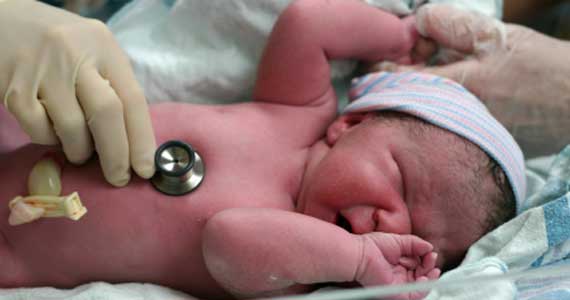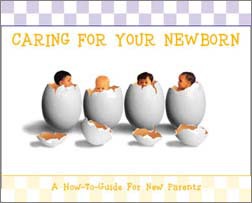Caring for your newborn begins during birth. Your obstetrician or nurse midwife and nurses all work quickly to help your baby take his first breath and keep him from breathing fluids into his lungs. Once your baby is breathing on his own, the umbilical cord is clamped and cut. The clamp will stay on for until the stump is dry and quits bleeding, usually 24-48 hours. After you have a chance to spend some time with your newborn, he will be dried to keep him warm and a quick check for obvious problems. An Apgar test is given to find out if your newborn needs special care. This simple test measures your newborn’s heart rate, breathing rate, muscle activity, reflexes, and skin color. The Apgar test is given at 1 minute after birth and repeated at 5 minutes after birth. Footprints and thumbprints are taken of your newborn for identification; an identifying ankle band is put on your baby and a matching band on your wrist.

Apgar score
An Apgar score is a way to measure a newborn’s condition at birth. The newborn’s heart rate, respiratory effort, muscle tone, reflexes and color are rated at 1 minute and again at 5 minutes after birth. Each of these factors are given a rating of 0, 1 or 2, then the results are added up for the final Apgar score. The maximum final score is 10. A rating of 7-10 is good to excellent, 4-6 is fair, and less than 4 is a poor condition. A low score at 1 minute is a sign the newborn is having problems adapting to life outside the mother and helps decide if resuscitation is needed. The Apgar test at 5 minutes gives a better picture of the newborn’s overall status. If the newborn scores less than 7 at five minutes, the test is done again at 10 minutes. If necessary, the Apgar test is done at 10, 15 and 20 minutes after delivery.
Care in the delivery room
His mouth and nose are suctioned to keep your newborn from breathing fluids into his lungs. Your newborn is checked for bruises, and all parts of his body are looked at to see if they are normal. The number of weeks spent in the womb, called gestational age, is determined. Babies born too soon may need special care. Your newborn is weighed and his head and chest are measured. Knowing his birth weight is important. From now on weight checks are the best way to know how well your baby is growing. Babies lose body heat quickly, especially if their head is wet. Your newborn is wrapped in warm blankets and a cap is put on his head to prevent the loss of body heat.
Your newborn is learning that you will be there when he needs and wants you.You will probably get to hold your baby soon after delivery. Hold your newborn next to your body to keep him warm and comfort him. Gently stroke your baby and talk to him. Let him learn his mother’s voice and his new name. If you plan to breast-feed, offer him your breast. It may take a feeding or two for your newborn to learn to suck, swallow, and breathe—all at the same time. Your newborn is learning that you will be there when he needs and wants you.
Some hospitals offer “rooming-in” where you and your baby stay together in the same room. Other hospitals have a newborn nursery, and you and your baby are together when your newborn is awake. If your newborn is cared for in the nursery, the nursing staff will keep you informed about how your newborn is doing.
An antibiotic is put into your newborn’s eyes within 2 hours of birth to prevent infection. An ID bracelet is placed on you and your baby. The bracelet has your name, your baby’s name, and the day and time your baby was born. Both bracelets are checked every time your baby is taken from you or returned to you. Within a few hours after his birth, your newborn will be given Vitamin K to protect him against internal bleeding. A blood sample will be taken from the umbilical cord while it is still attached to the placenta. This blood will be used to decide your baby’s blood type.
The nurses will check your newborn’s sucking, swallowing, and gagging reflexes. They may feed him sterile water to be sure the passageway to his stomach is open. Your newborn will be weighed several times before he goes home. The nurses will watch your baby’s activity level, color and breathing.
Your baby will get a head-to-toe check every 4 to 8 hours by the nurses. Also a physician or nurse practitioner will also give your baby a complete exam.
Preventive care for your newborn
After delivery, blood is drawn from your newborn for screening tests. PKU (phenylketonuria) is a test you may have heard or read about. If PKU is present and untreated, it can lead to seizures and mental retardation. Other screening tests may be done if your newborn is at risk for certain diseases. Your newborn may receive the hepatitis B vaccine. Your baby will get his first bath and the stump may be painted with an antibacterial dye to prevent infection.

Caring For Your Newborn
Table of Contents
Introduction
Congratulations!
Caring Begins at Birth
Your Newborn’s Hospital Check-up
Ten Fingers and Ten Toes
Special Care for Your Newborn
When Your Newborn Cries
Changing Your Newborn’s Diaper
Feeding Your Newborn – breast or bottle feeding
Feeding Your Newborn – spit ups, weight gain, BMs
Bathing Your Newborn
Dressing Your Newborn
Shhh!! We’re Sleeping
Keeping Your Baby Safe
Your Newborn’s Admirers
Taking Your Newborn Out
If Your Newborn Gets a Cold
If You Have Questions
Well-baby Check-ups
When to Call Your Pediatrician
Take Care of Yourself, Too

